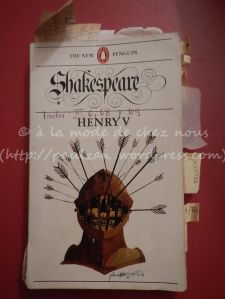On 30 October 2014, I heard my Singaporean wife utter a word of ‘franglais’ for the first time and this is the reason why I feel compelled to record the date — probably not for posterity, but rather for our own list of special dates. ‘Franglais’ is the combination of French and English (French + anglais) words, a linguistic mangling which I am familiar with as my mother is English and my sister, brother and myself were brought up in a French-speaking region (‘Suisse romande’), so that we would sometimes lapse into such linguistic faux pas when our brains were tired and we could not remember the proper word in English — although this might be more adequately described as ‘Englais’ I would suppose. 😉
So what was my wife’s first word of ‘franglais’? Well, as it is still the mushroom season (although I guess it must be drawing to a close by now), my wife’s first word of ‘franglais’ was « cueilling » (PS I have used French quotation marks to make it more French), from the French verb ‘cueillir’ (to pick, to gather) and the English gerund form — thus a bit like the (now fully accepted) ‘franglais’ word ‘parking’ (car park).
Did I frown when I heard my wife use this word of ‘franglais’? No, not at all. On the contrary, I was rather quite pleased. Not only because it reminded me of the times when we used to resort to such linguistic combinations at home in our Italian-English household, but also because my wife is in good company.
No, I was not referring to Miles Kington’s famous series ‘Let’s Parler Franglais’, but to the Bard himself. To illustrate to my wife the linguistic licence she had taken, I went to my bookcase and pulled out a copy of Shakespeare’s Henry V — she was quite lucky because most of the works of literature I own are in the cellar (shame on me!)…
In Henry V, Shakespeare’s jingoistic play about an important episode of the Hundred Years’ War which pitted the kingdoms of France and England against each other for over a hundred years, there are unsurprisingly several instances of ‘franglais’. However, to make my point more forcefully, I opted for one of the more salacious parts (‘lavatory’ Shakespeare as one my lecturers, George Steiner, would have described it in his lectures on Shakespeare at Geneva University), i.e. in Act III, scene four, where Catherine de Valois (or Kate, to use her English name), the daughter of the French king, asks her gentlewoman to give her some basic instruction in the French tongue:
KATHERINE Le foot et le count! O Seigneur Dieu! Ils sont les mots de son mauvais, corruptible, gros, et impudique, et non pour les dames de honneur d’user. Je ne voudrais prononcer ces mots devant les seigneurs de France pour tout le monde. Foh! Le foot et le count! Néanmoins, je réciterai une autre fois ma leçon ensemble: d’hand, de fingre, de nailès, d’arm, d’elbow, de nick, de sin, de foot, le count.
Act III, scene four as played by Emma Thompson in Kenneth Branagh’s (acclaimed) cinematographic adaptation (1989) of Shakespeare’s Henry V.
Okay, okay, technically, this is a case of salacious double entendre and I would be inclined to say ‘please pardon my French’, as they say in England, but I think it will have illustrated the richness and the long history of ‘franglais’…
Links

